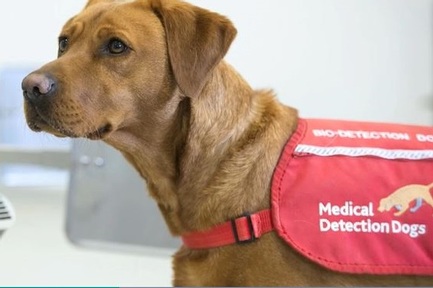Trials begin to see if dogs can detect COVID-19 in humans
Trials are set to begin in the UK for specially-trained COVID dogs who may be able to sniff symptoms of the disease in humans even before symptoms appear.

The six COVID dogs, made up of Labradors and cocker spaniels can be trained to detect the odour of disease at the equivalent dilution of one teaspoon of sugar in two Olympic-sized swimming pools of water.
Once trained, the dogs could be used in airports and testing centres
With 10 years of research, Medical Detection Dogs has successfully trained dogs to detect diseases like cancer, Parkinson’s disease and malaria.
The initial phase of the trial will see NHS staff in London hospitals collect odour samples from people who are infected with coronavirus and those who are uninfected. When trained the dogs could each screen up to 250 people per hour.
Samples of breath and body odour could come from a number of sources, including used face masks.
Dr Claire Guest, co-founder and chief executive of Medical Detection Dogs, said: “We are delighted that the government has given us the opportunity to demonstrate that dogs can play a role in the fight against COVID-19. They have the potential to help by quickly screening people, which could be vital in the future.
“We are sure our dogs will be able to find the odour of COVID-19 and we will then move into a second phase to test them in live situations, following which we hope to work with other agencies to train more dogs for deployment.
"We are incredibly proud that a dog’s nose could once again save many lives.”
The dogs searching for COVID-19 will be trained in the same way to detect diseases such as cancer, Parkinson’s and bacterial infections by sniffing samples in their training room and indicating when they have found it.
They are also able to detect subtle changes in temperature of the skin, so could potentially tell if someone has a fever.
If the initial three month trial is successful, the government will deploy the dogs to the places most useful. This could include airports and testing centres. These dogs could provide a fast and non-invasive detection method alongside the government’s robust 5-pillar testing strategy.
Professor Steve Lindsay, from the Department of Biosciences at Durham University, said: “We’re absolutely delighted to be awarded this funding so we can start this important research.
“If we can show that our trained dogs can identify people carrying the virus, but who are not sick, it will be a game changer.
“We will then be able to scale-up the use of dogs at ports of entry to identify travellers entering the country with the virus. This will be important to prevent a second wave of the epidemic.”
The dogs have previously been trained to detect malaria from foot odour samples - in this case, nylon socks worn by apparently healthy children in the Gambia.
Professor James Logan, lead researcher for the work and head of the department of disease control at the London School of Hygiene and Tropical Medicine, said: “Our previous work has shown that malaria has a distinctive odour, and with Medical Detection Dogs, we successfully trained dogs to accurately detect malaria. This, combined with the knowledge that respiratory disease can change body odour, makes us hopeful that the dogs can also detect COVID-19.
“I would like to thank the UK government for their support of this pioneering research through this funding. We’re excited to do this trial, and confirm whether these bio detection dogs can be used to screen for COVID-19.
“If successful, this approach could revolutionise how we detect the virus, with the potential to screen high numbers of people.”
Like what you read? For more news click here
Latest News
 29-Jul-24
Dementia Bus gives carehome.co.uk staff insight into life with dementia
29-Jul-24
Dementia Bus gives carehome.co.uk staff insight into life with dementia
 27-Jul-23
UK's top home care agencies in 2023 revealed
27-Jul-23
UK's top home care agencies in 2023 revealed
 30-Nov-22
A quarter of older people keep their falls secret from family
30-Nov-22
A quarter of older people keep their falls secret from family
 29-Nov-22
'Covid-19 has not gone away' say terminally ill
29-Nov-22
'Covid-19 has not gone away' say terminally ill
 28-Nov-22
IT consultant who received poor care opens 'compassionate' home care business
28-Nov-22
IT consultant who received poor care opens 'compassionate' home care business